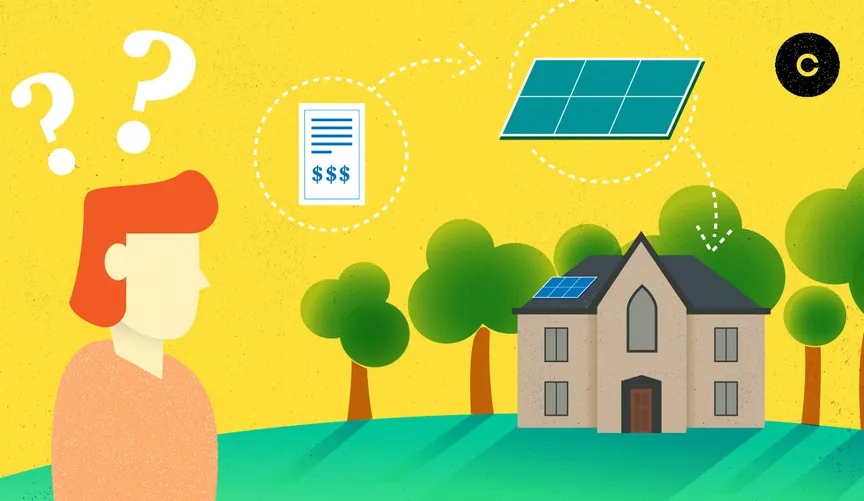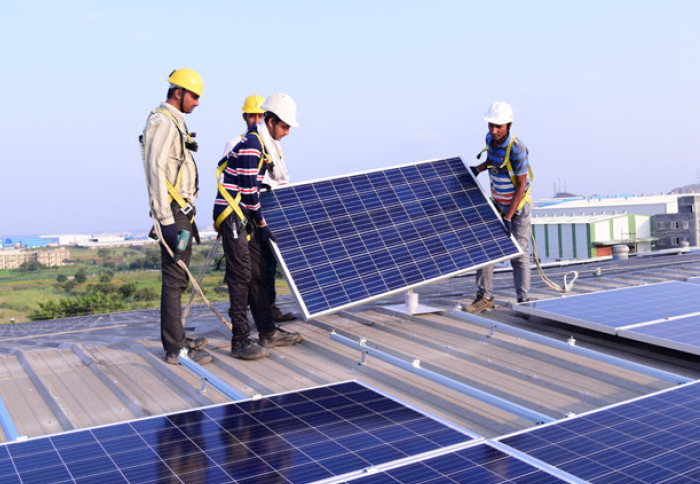I have been thinking about putting solar panels on the roof of my abode for some time now. Solar panels allow me to convert sunlight into electrical energy.

Why do this? For two reasons. One, my electrical bill for heating — in particular, in the winter – continues to rise. A winter month can cost me upwards of $400 to heat my place in Seattle.
Second, shouldn’t we all be looking for ways to reduce the demand on our grid? Isn’t having solar on your home the politically correct and environmentally friendly thing to do?

For these reasons I have been looking at putting solar panels on my roof. Several years ago I took the first step towards this by putting the framework for solar panels on my roof – not the panels themselves, but the framing for them. In addition, I had a conduit placed from the roof to my electrical fuse box panel to hold whatever wiring would be required later when I presumably installed the panels themselves.
Step 1 completed, I said to myself. Step 2 is to finish the job. Install the panels, connect the wiring, and put in the control and shut off boxes required under city code. So, I reached out to the company that had done the installation of the framework to get a bid to complete the work.
To the company’s credit, they responded and came out in person to double check the situation before giving me a bid to do the work. Good people.
SHOCKER ALERT!!!! When I received the bid, I was shocked. Taking into account that I have already paid for the framework for the panels on the roof, the bid came in at over $13,500.
To clarify, this quote assumes two significant benefits from state and federal governments to encourage me to proceed with solar. The state government in Washington State forgives the sales tax on the transaction, which is almost 10% of the bid. Not insignificant. Without these two incentives the bid would have been almost $20,000.
Our federal government provides this year a tax credit equal to 26% of the project cost. That means whatever you will be paying in taxes to the feds for 2022, you can subtract $4,700 (equal to 26% of the project’s cost). Again, very significant.
Now, back to the proposed bid. The bid of over $13,500, takes into account both the state and federal government incentives to proceed.
Yes, the price quoted shocked me. But, that shock was nothing compared to the shock I felt when I did the calculation to figure out how many years would it be before this “investment” in solar paid off for me. In other words, as a result of putting solar on my roof, my electrical heating bill from my utility company would be reduced as a result. How many years will it be before I recover, or just breakeven, on my capital expenditure in 2022?
HOLY COW!!! 27 years!!!!!!!!!!!!!!!!!!!!!!!!!!!!!!!!!!!!!
I could not believe this. I must have made an error. And this analysis did not even include the monies I had already spent to frame the solar panels, made a few years ago. The solar panels themselves may degrade over 25 years. And technology may change between now and 25 years from now.
I call a couple of other solar companies. Sure enough, they say I am probably right in my analysis. Then I connect with the company the gave me the bid, I ask them. Surely, I have made an error in my analysis, I say to them.
No, they write back. Neil, your analysis is correct!
Folks, in 27 years I will be 105 years old.
Given that fact, does making a $13,500 capital investment in 2022 make any sense? Regrettably, my answer has to be no.

Yes, the breakeven point would be sooner if I had a much larger roof (say an acre or two!). As you can see from this overhead photo of my roof, I had planned on only having 9 panels. Or it might be better if I lived somewhere else than Seattle which has more sunshine such as Phoenix, for example.
Still, I am blown away by this whole experience. I thought we in this country were trying to encourage homeowners to take the steps to install solar. To do this for all the right reasons. For energy independence, for reducing greenhouse gas emissions, for lower carbon footprints, for reducing the environmental impact of your home, for climate change, reducing the demand on our grid, for supporting your local businesses, for creating jobs in clean energy, and for reducing your energy bills (cost savings).
What happened to the phrase – it is free to capture the power of the sun?

Wow, that is truly sad. Especially with the push to go green. We did install 20 panels in Yuma and our electric bill for all of 2021 was only $78. Yuma is the sunniest city in the world with 300 days of sunshine 🌞 It will on take us about 10-12 for our capital recovery.
My sister and brother-in-law installed solar on their house for $20,000 when they retired to Guemes Island. They enjoy getting zero electricity bills and sometimes getting small checks from their electrical company when they feed more into the grid than they take out. They believe this is a home improvement that, just like remodeling a kitchen, adds to the value of their property for the next owner.
Do it Neil. Given your depressingly healthy lifestyle in recent years, you should make 105.
Neil, we came to the same conclusion here in Tucson. We wanted them for heating our pool (not for generating electricity). Our break-even would be ~10 years, at best. But if roof repairs are needed during those 10 years, factor in $3k for removing/re-installing the panels. The real killer was when they told us we’d have to winterize them, meaning no solar pool heating for ~4 months out of the year!